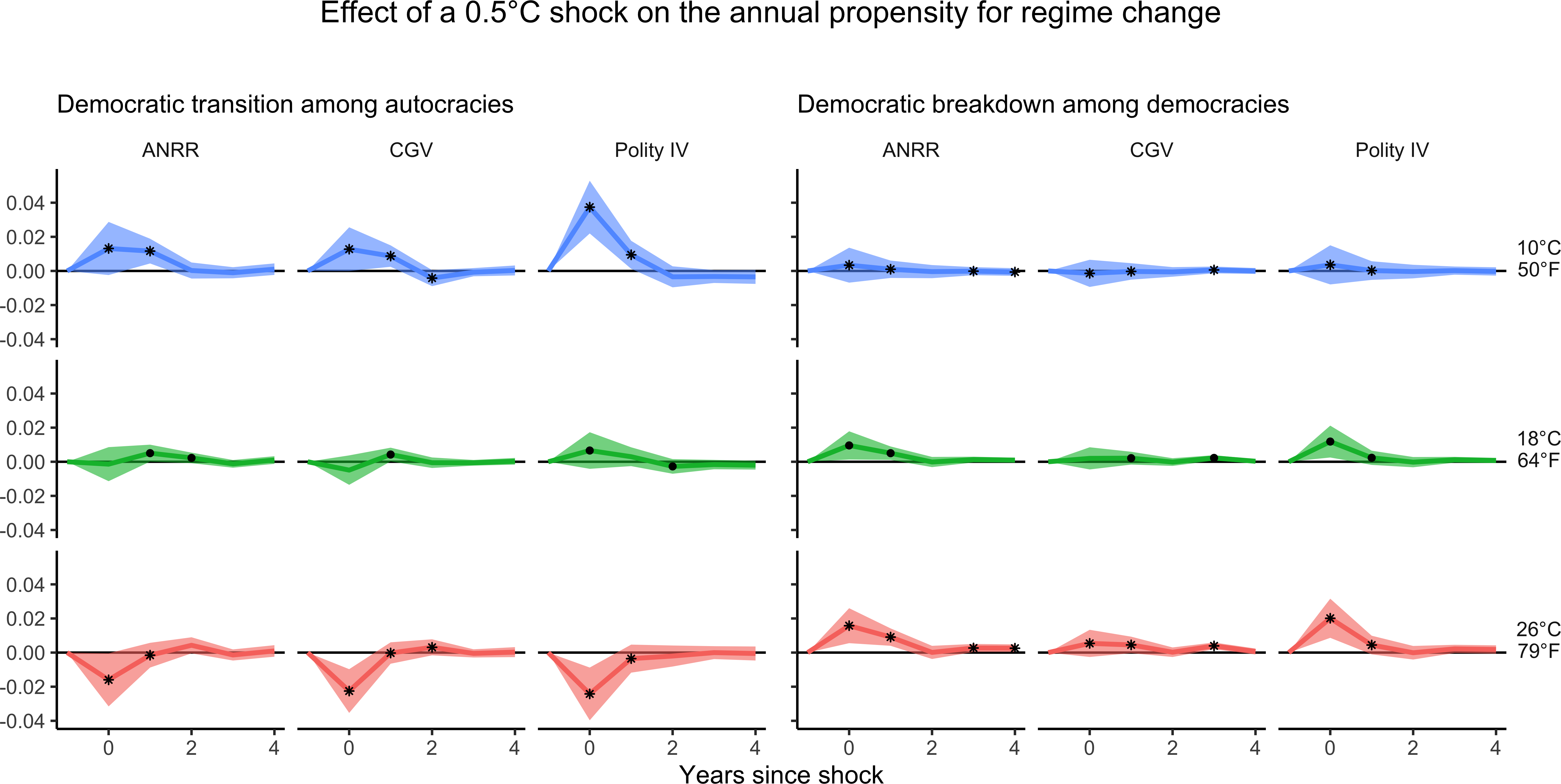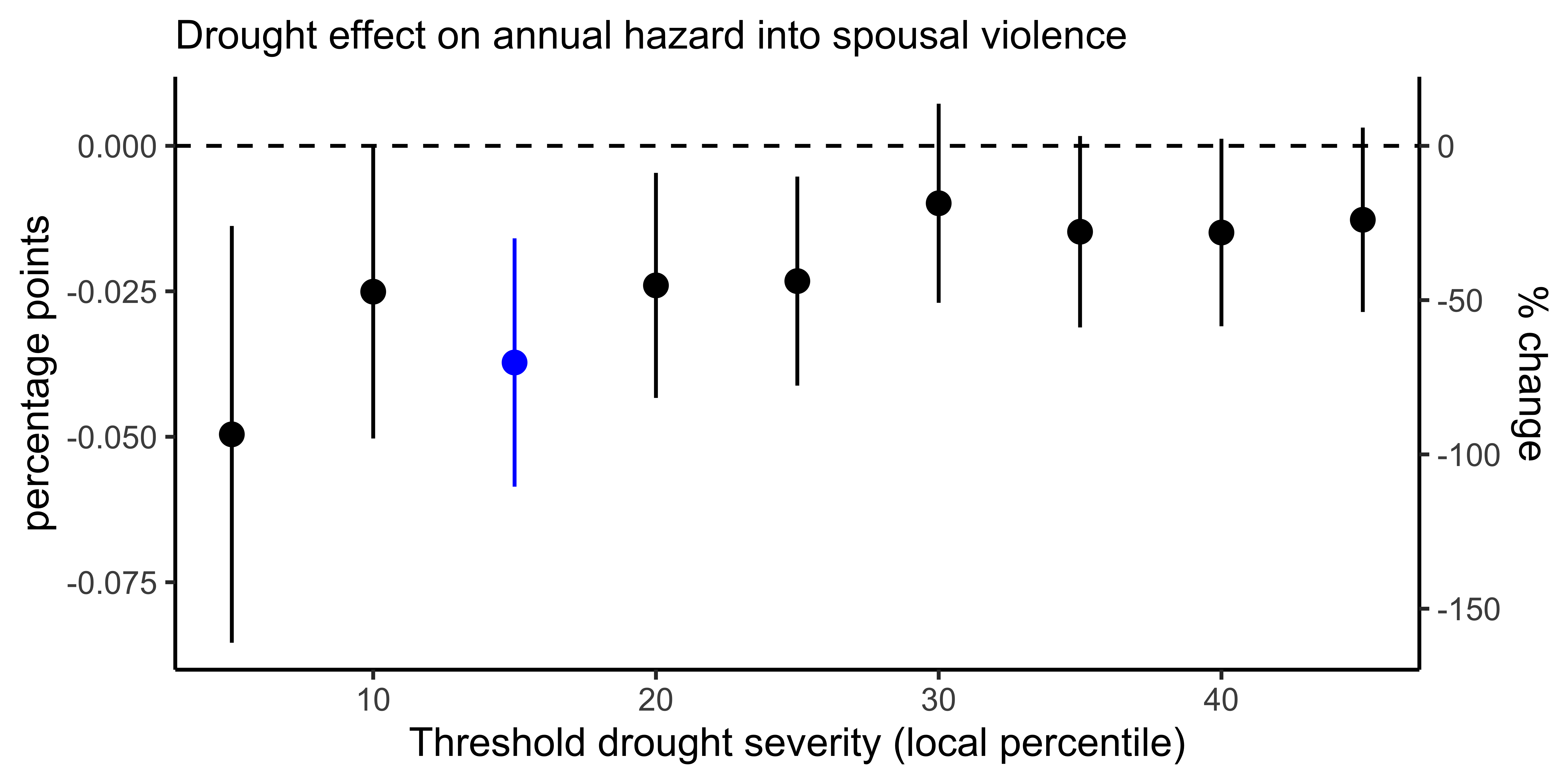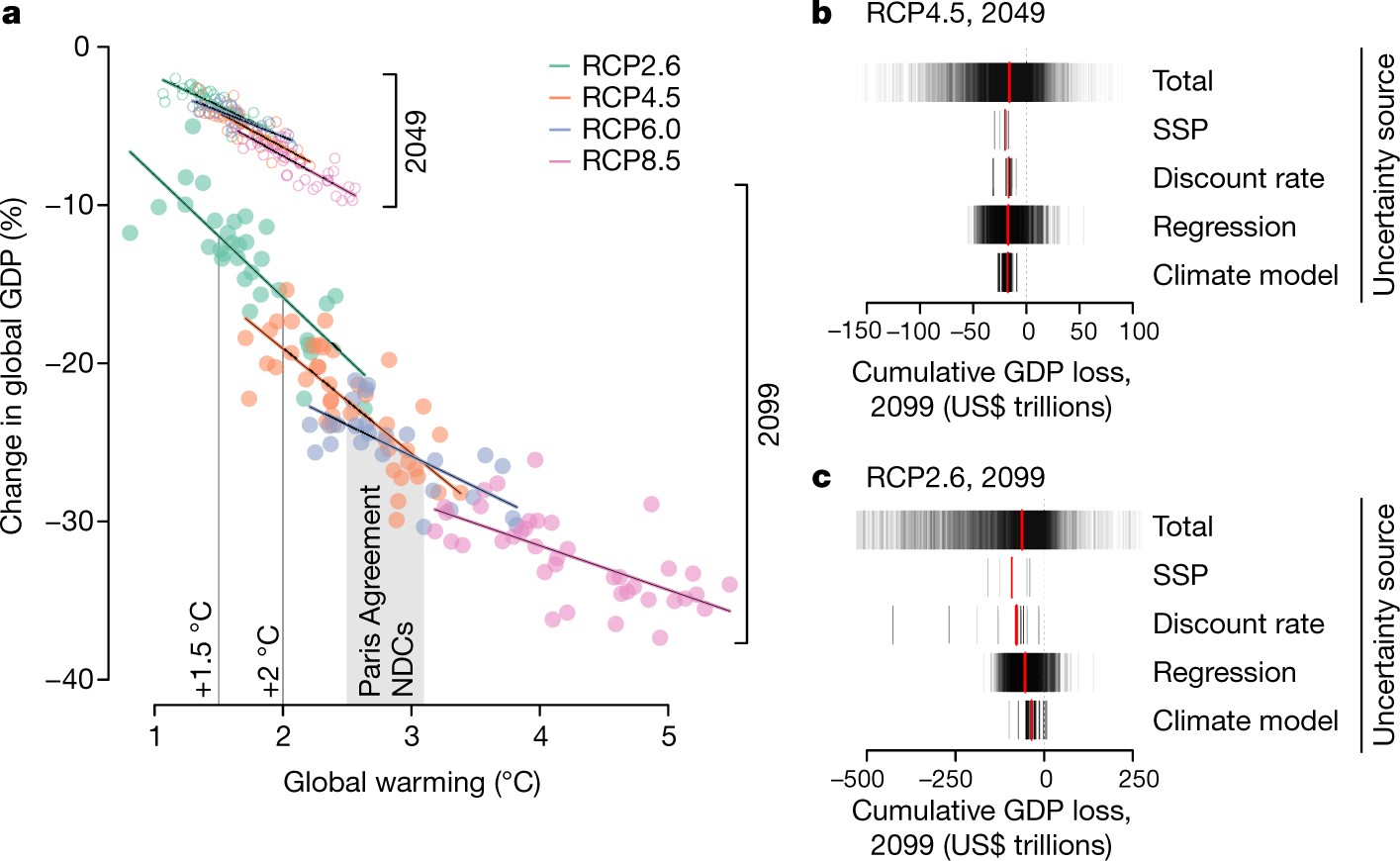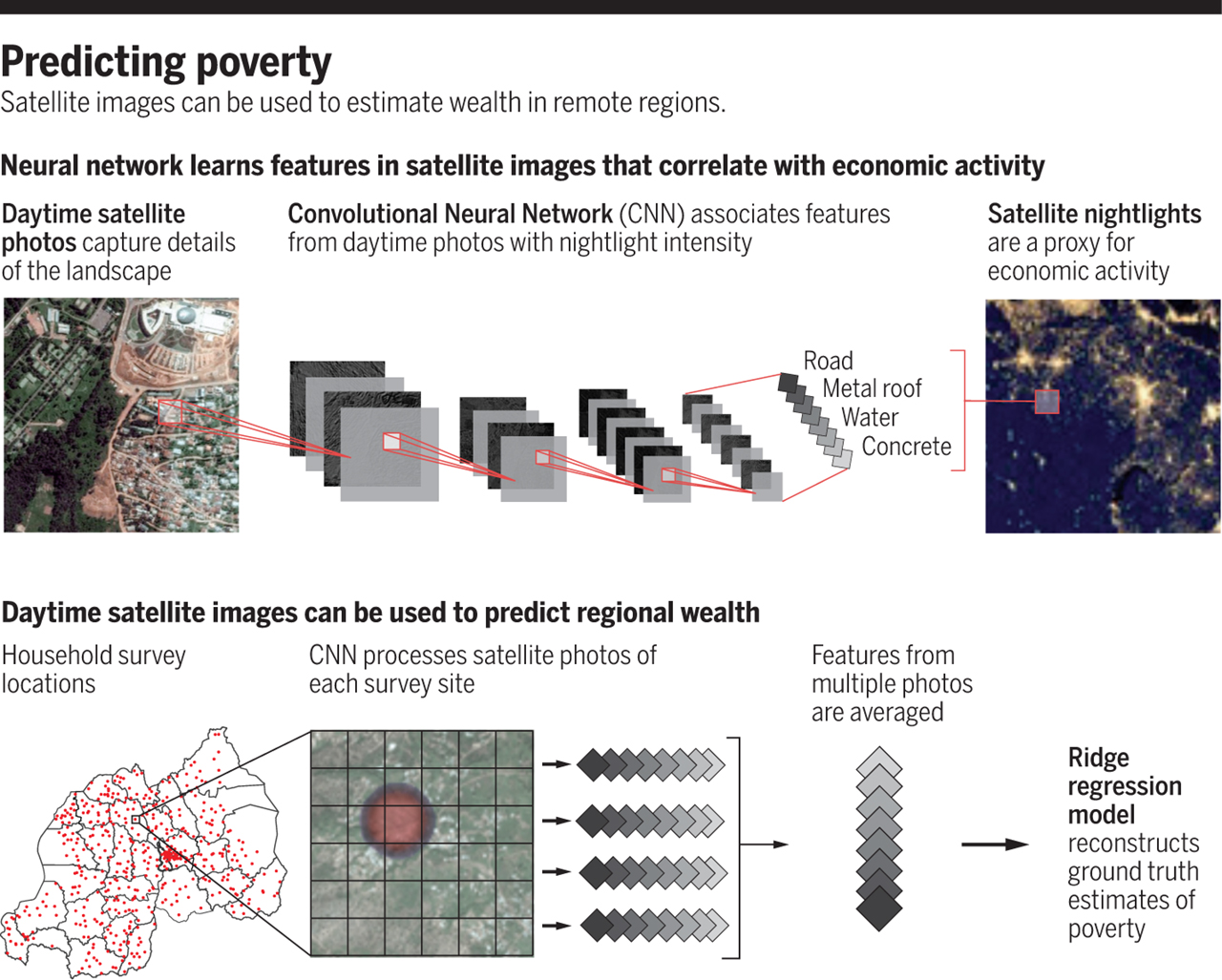By necessity, I draw from diverse subfields within economics and depend on collaborations across the social and environmental sciences, adapting theory, data, and methods to the demands of each research question. As such, past interdisciplinary projects have been published in Science and Nature. In the near term, I intend to prepare my dissertation works for publication in top economics and science journals and to initiate a complementary program of research relating their findings to the design of equitable and politically viable climate policy.
Working papers
Global income distributions under climate change
Understanding how climate change impacts global economic inequality is critical to the design of equitable and politically viable climate policy. Yet where evidence of this relationship is available, analysis is generally limited to coarse comparisons of country-level aggregates, remaining agnostic to disparities across individuals within those countries. This paper advances this literature using newly available distributional income data to incorporate within-country dimensions of ‘climate inequality’. First, I document new evidence that temperature shocks persistently exacerbate inequalities within countries by disproportionately reducing income growth among the lowest income-earners, especially in warm-climate economies. Second, I use these empirical results to compare the historically observed distribution of global income to its counterfactual distribution had global warming been stabilized at 1980 levels. I estimate that systematic warming between 1980-2016 increased global income inequality between countries by 8.7% [4.9, 13.3] and within countries by 2.6% [0.0, 5.6]. To my knowledge, this is the first such decomposition of distributional climate damages and the latter quantity has not previously been estimated. Altogether, these new results represent the most comprehensive evidence yet of the globally regressive economic impact of climate change.

Temperature, institutions, and the political climate
A draft is available upon request. Results reported here are preliminary.
Despite widespread regard of climate change as a threat to global stability, its political consequences remain undertheorized. To fill this gap, this paper derives two competing hypotheses by repurposing influential theories of demand-led political transitions from the political economy literature. The first posits that adverse environmental shocks reduce the opportunity cost of contesting autocratic governance, improving prospects for democratic reform. The second instead suggests that these shocks better resemble exceptional crisis conditions which motivate citizens to compromise negative liberties for security more credibly assured under states of emergency, thereby diminishing democratic institutions.
I test these hypotheses first by measuring the dynamic impacts of identified temperature shocks on survey-based proxies for the demand for democracy. I then study how these shocks affect the quality of political institutions as measured by commonly used multi-valued and dichotomous measures of democracy. Results indicate that an economically adverse 0.5$^\circ$ shock reduces the likelihood of democratization by 1.5-3.7 percentage points depending on the local climate and the operating definition of democracy. These effects are concentrated in the year of the shock, showing little evidence of persistence. Conversely, the same shocks are found to increase the probability of democratic reversal by 0.6-2.0pp in a representative 26$^\circ$ democracy but has no discernible effect on a 10$^\circ$ democracy. I interpret these results as evidence supporting the “state of emergency” hypothesis but also suggestive that sufficiently credible state capacity may insulate democratic institutions from environmental disruption.

Evidence of a drought effect on the hazard into spousal violence
with Tanushree Goyal
A draft is available upon request. Results reported here are preliminary.
In this project, we explore how income shocks impact the probability that a previously non-violent marriage becomes violent. We combine high-resolution weather data with comprehensive duration data derived from household surveys of domestic violence in India to characterize these dynamics. Preliminary findings suggest that drought-induced shocks of a magnitude expected once every 4-5 years reduce the annual hazard into first-time intimate-partner violence by 70% in the formative years of a marriage. These results are broadly consistent with recently published evidence on the effect of local droughts on the incidence of other gendered cultural practices such as child marriage and female genital cutting.

Publications
Large potential reduction in economic damages under UN mitigation targets
Marshall Burke, W. Matthew Alampay Davis, and Noah S. Diffenbaugh (2018)Nature 557(7706): 549–553.
We present a probabilistic framework for assessing aggregate economic impacts of anthropogenic warming. Our construction decomposes uncertainty associated with mid-century and end-of-century economic projections into distinct sources of uncertainty associated with i) econometric estimation of the economic effects of environmental change, ii) climate models of the spatial distribution of anthropogenic warming, iii) the projected schedule of greenhouse gas concentrations associated with a radiative forcing, and iv) the social discounting regime of choice. We apply this framework to characterize the economic benefits of climate policy, emphasizing how achieving the most ambitious mitigation targets of the 2015 Paris Agreement would obviate essentially certain economic calamity that will otherwise concentrate in developing countries.

Paper materials and links
- Paper: official $\cdot$ ungated
- Replication files
- Stanford ECHO Lab website
Select citations
New York Times $\cdot$ The Guardian $\cdot$ Governors of New York, California, and Washington $\cdot$ IPCC Special Report on Global Warming of 1.5°C (SR15) $\cdot$ MSNBC (TV) $\cdot$ “The Uninhabitable Earth” by David Wallace-Wells $\cdot$ Rezo $\cdot$ Bernie Sanders $\cdot$ US House Committee on Financial Services $\cdot$ IPCC Sixth Assessment Report (AR6-WGII)
Select press
Nature $\cdot$ Stanford $\cdot$ Bloomberg $\cdot$ CBS (TV) $\cdot$ The Guardian $\cdot$ Reuters $\cdot$ The Hill $\cdot$ Yahoo $\cdot$ Axios $\cdot$ The New Yorker $\cdot$ Business Insider $\cdot$ Rolling Stone $\cdot$ The Daily Show (TV)
Combining satellite imagery and machine learning to predict poverty
Neal Jean, Marshall Burke, Michael Xie, W. Matthew Alampay Davis, David B. Lobell, and Stefano Ermon (2016)Science 353: 790–794.
Efforts to study and design policy addressing the challenges of global poverty and inequality are hampered by the infrequency and prohibitive expense of reliable measurement of welfare, particularly in the developing world. Here we demonstrate a scalable method for overcoming this data scarcity which works by extracting economic information from an unconventional but inexpensive source of data with increasingly frequent and essentially global coverage: high-resolution daytime satellite imagery.
Our “transfer learning” pipeline proceeds by first assigning a convolutional neural network model pre-trained for generic image classification the task of identifying features in the daytime imagery predictive of night-time luminosity, a crude proxy for economic activity. In effect, the CNN learns to produce a nonlinear mapping from the unstructured images to a low-dimensional vector representation of its most economically informative features. Ridge regression models are then optimized to produce out-of-sample estimates of consumption expenditures and asset wealth. In an initial application to five diverse sub-Saharan African countries—Nigeria, Tanzania, Uganda, Malawi, and Rwanda—our entirely open-source models are able to explain up to 75% of the variation in village-level outcomes as measured by household surveys, demonstrating potential to reduce misallocation costs in the administration of targeted social programs.

Paper materials and links
- Paper: official $\cdot$ ungated
- Replication files: code and data $\cdot$ closed issues
- Authors’ blog posts: summary $\cdot$ genesis $\cdot$ update
- Sustain Lab website
- Non-technical animated video summary
Select press
Science $\cdot$ Stanford $\cdot$ The Washington Post $\cdot$ BBC $\cdot$ Scientific American $\cdot$ The Atlantic $\cdot$ The Onion $\cdot$ Bill Gates $\cdot$ Center for Global Development